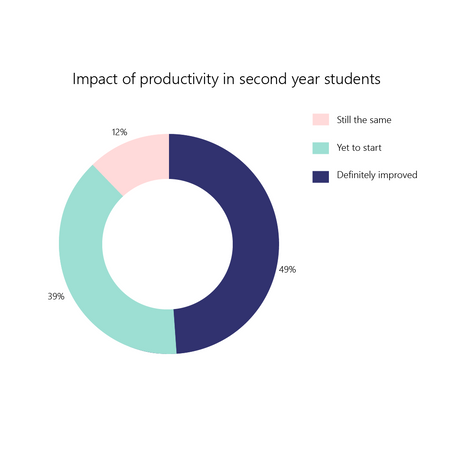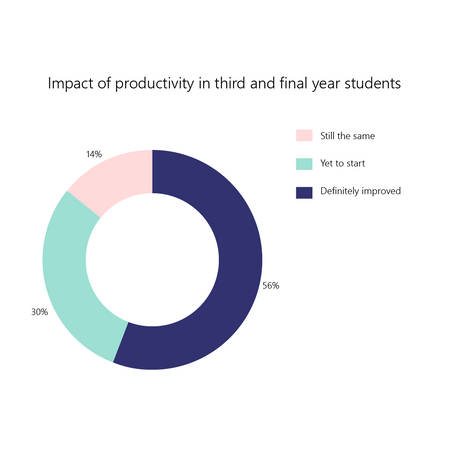The Shifting Status Quo Pt I
- BSP

- Nov 6, 2021
- 7 min read
Updated: Nov 6, 2021

Introduction
Despite the apparently flimsy state of the world, all of us are trying to snap back to pre- pandemic normalcy. But when, if at all, will life go completely back to normal? For some, “normalcy” is about very simple things - returning to your favorite cafe, or just roaming the campus streets freely with friends. For others, it's a bit more than that - getting to attend physical classes, enjoying fests the way they used to be.
Well, we aren't quite there yet. But we are taking baby steps towards life pre-Covid, or at least towards whatever the new “normal” turns out to be. What will this “new normal” look like? How long until we get there? What does life look like for the IIT Delhi student in the meantime?
[All student data in this article is from the UG section due to a very small PG response.]
Acads and Productivity
Shocked and disappointed by poor test performances and ‘abysmal’ attendance, a few weeks ago the Director warned students that IITD academics were soon going back to ‘normal’. This mail coincided with some questions that we at BSP were asking ourselves: As students return back to campus, is academic life really returning to normal? Has onboarding helped students study and work? How have the 2nd year students, on campus for the first time, adjusted to studying in IITD’s academic atmosphere?
Firstly, we asked students whether their focus and productivity had increased after onboarding. Amongst the sophomores (read: freshers), 49% of the respondents to our survey felt that their productivity and focus on academics had gone up since onboarding. This number went up to 56% for the 3rd and 4th years. The escape from the monotony of studying at home for a year seems to have given a much needed scholastic boost to many, although a significant portion of IITD residents remain unaffected.
Those whose acads have got a push in the right direction also seem to be making good use of the resources that the campus provides. 45% said they regularly use the facilities like the central library and the CSC, and 41% said they use these resources at least sometimes.
Ironically though, for a lot of people, the campus itself is one of the biggest threats to their acads. 39% of sophomores claimed that they have been “chilling on campus” since they onboarded, and haven’t yet begun taking their academics seriously. A student pinned it on there being just too much to do on campus! “It’s always tempting to try your hand at all the different activities on campus. A lot of my time also goes in chilling with friends and just exploring the campus.” We all remember our feverish fresher days, so it’s difficult not to sympathize. Amongst the seniors who’ve been there, done that - the number of people just chilling goes down to 30%.

Sleep and Studying
We also wanted to know how well people are sleeping on campus. So we asked them if their number of hours had changed after onboarding. As it turns out, quality of sleep is tightly linked to the productivity of the students on campus. Around 62% of those who felt their academic performance has improved or stayed the same, reported an increase or no change in the duration of their slumber. On the other hand, amongst those who said they haven’t been able to give much time to academics since onboarding, the majority reported they weren’t quite able to catch forty winks regularly. A second year student explained their situation - “I spend a lot of time in Axlr8r. I also used to play daily when the grounds were open, which, when you consider acads, adds up to a decreased sleeping time.”

Social Lives
The overall consensus among our respondents appears to be that onboarding has improved their social lives. This conviction weakens as you move up the years, with 4th years having a 70-30 split in favour of onboarding, compared to the overwhelming response of 86% by the sophomores. It also seems that the lifestyle of fourth years has seen the least impact, with the third years somewhere in between.
Comfort and Contentment
We asked people about how happy they were on campus, how lonely they felt, and if they had any regrets about onboarding. 2nd year students in general were happy - ecstatic, even - to be on campus, and on average met around 6 friends every day. However, their comfort with approaching students and staff members was noticeably less, with around 20% of our 2nd year respondents scoring their comfort level at 1 or 2. Hopefully with time, and efforts made by more seasoned residents of IITD, they will settle down and feel at home.
Overall, out of people who said their happiness was in the 1-3 range, 46% were getting less sleep than they used to before onboarding.
On the topic of comfort levels, we were surprised to see that 4th year students were the least comfortable approaching students and staff on campus: 3.19 as compared to 3.56 for 2nd years and 3.68 for 3rd years. We are as mystified as you - we speculate that these students probably don’t want to socialize or approach people. Additionally, there might be some mistrust between the senior UG students and the campus staff, as they have been accustomed to a more relaxed atmosphere on campus. One third year student told us, “Guards don't treat students very well, most of them tend to target couples instead of the huge groups of freshers that don't follow Covid guidelines. I think, guards have been given too much power and most of them are misusing it.” On the other hand, a fourth year student who spoke to us was annoyed at the students on campus. “Things on campus are not as rosy as you may think [...] basically no one is following protocol.”
How many friends do you meet?
To understand people’s social lives better, we asked them how many people they hung out with in a day (on average). Our gregarious 2nd years were meeting around 6 people every day (whew!) while 3rd and 4th years averaged a sedate 4-5 friends. For anyone who has seen groups of 2nd years roaming around campus, exploring and experiencing it for the first time, this comes as no surprise. It’s also worthwhile to note that meeting 5 people every day is a large number in itself - not something any of us could have thought of in the past year’s lockdown. And clearly, the increased social contact is making people feel good, because very few of our respondents said that their loneliness was at a 4 or 5.
When we took a look at people who met 0-4 friends a day (less than the college average of 5), we found that 3rd years were represented disproportionately - more than half of them (56%) met less than 5 friends a day. We also realized that 3rd years had reported the greatest increase in productivity and usage of academic resources on campus. So it’s reasonable to assume that 3rd years are feeling the pressure of acads, internships and projects, and so are dialling back the partying.

Lonely people in crowded rooms
We were troubled, however, to find that 25% of our respondents had regrets about onboarding, so we tried to understand why this might be the case.
One of the major reasons that seem to emerge are that the students did not get the rise in productivity that they expected. “I onboarded so that I could study well, but that's not the truth, I can't study anymore here,” said one frustrated sophomore. “I haven't seen any improvement in myself, I have only started wasting my time here.” It seems to be a fairly common opinion among these people that changing the situation didn’t help them put their lives in further order: “The situation is still the same. Same online classes, online exams, same performance.”
Another major reason, particular to the second years, seems to be that of homesickness. “I miss my family,” was a common theme amongst our sophomores.
The third years, however, seem to regret coming because of how different campus is from what they remember. “The authorities fine us uselessly,” one third year wrote. “The guards have gone hyper with the extra power they have gotten.” another added. The sentiment that guards are imposing arbitrary rules and misusing their authority seems to be common, with another student ranting, “The moral policing by the guards and some irrelevant rules they impose also feed into making students question their judgment to come back to the campus.”
And finally, there are people who feel more disconnected on campus than they did at home. “In the online sems, we were free to talk and approach anyone, but coming to campus, I realized that people are selective and only go along with their particular groups. So many times, participation and interaction are low among new students and groups, and making new friends is not just a one text thing now.” Loneliness has hit some students hard, with another discontent student observing, “I think it would have been better if I was at home. At least I had true friends and family there. But here, making friends is becoming very difficult for me. Even those I thought to be nice friends are not the same as they were in online mode. It's more lonely than chill here.”
Love in the Time of Covid
Finally, we also wanted to understand whether onboarding has changed romance for better or for worse. The consensus regarding improvement of social life is echoed in the responses we received regarding relationships, around 75% of which have improved since onboarding, which might seem obvious considering that couples can actually spend time together, with a certain degree of freedom and privacy. In our story, it seems like all the Romeos and Juliets might finally be united, but that isn’t the case for all. A fourth of relationships have actually suffered due to onboarding, though it’s difficult to speculate why. One possible reason might be that only one person happens to have onboarded, who might be too preoccupied to spend time virtually with their significant other. For couples who live in the same city (and had the opportunity to meet before onboarding too), the Covid restrictions in the campus might be another factor contributing to it.












Comments